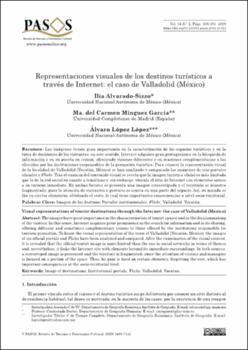Representaciones visuales de los destinos turísticos a través de Internet: el caso de Valladolid (México)
Date
2018Abstract
Las imágenes tienen gran importancia en la caracterización de los espacios turísticos y en la
toma de decisiones de los visitantes; en este sentido, Internet adquiere gran protagonismo en la búsqueda de
información y en su puesta en común, ofreciendo visiones diferentes y en ocasiones complementarias a las
ofrecidas por las instituciones responsables de la promoción turística. Para conocer la representación visual
de la localidad de Valladolid (Yucatán, México) se han analizado y comparado las imágenes de seis portales
oficiales y Flickr. Tras el examen del contenido visual se revela que la imagen turística oficial es más limitada
que la de la red social en cuanto a temáticas y, sin embargo, vincula el sitio de Internet con elementos ajenos
a su entorno inmediato. En ambas fuentes se presenta una imagen estereotipada y el territorio se muestra
fragmentado, pues la atención de visitantes y gestores se centra en una parte del espacio. Así, su mirada se
fija en ciertos elementos, olvidando el resto, lo cual tiene importantes consecuencias a nivel socio-territorial. The images have great importance in the characterization of tourist spaces and in the decisionmaking
of the visitors; In this sense, Internet acquires great prominence in the search for information and in its sharing,
offering different and sometimes complementary visions to those offered by the institutions responsible for
tourism promotion. To know the visual representation of the town of Valladolid (Yucatán, Mexico), the images
of six official portals and Flickr have been analyzed and compared. After the examination of the visual content,
it is revealed that the official tourist image is more limited than the one in social networks in terms of themes
and, nevertheless, it links the Internet site with elements beyond its immediate surroundings. In both sources,
a stereotyped image is presented and the territory is fragmented, since the attention of visitors and managers
is focused on a portion of the space. Thus, he gaze is fixed on certain elements, forgetting the rest, which has
important consequences at the socio-territorial level.





